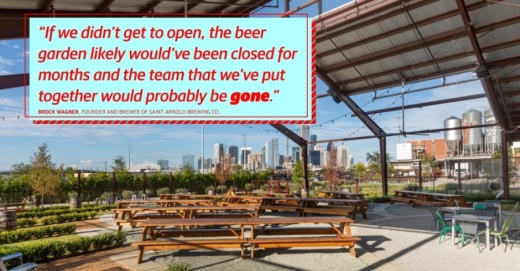In a twisting fashion, some breweries across the state may now reopen as restaurants after the Texas Alcoholic Beverage Commission on July 24 released new guidelines. Those new guidelines state all alcohol sales to distributors and to-go alcohol sales will not be included in a business’s 51% calculation.
In Texas, if an establishment makes more than 51% of its gross receipts from alcohol, it is considered a bar. Under Gov. Greg Abbott’s executive orders, bars statewide must remain closed as a precaution to prevent the spread of the coronavirus.
“Sales to distributors and retailers ... do not need to count toward the 51% calculation,” TABC Public Information Officer Chris Porter said in an email to Community Impact Newspaper.
The TABC’s July 24 ruling came at the end of a week in which several breweries across the state interpreted a loophole in an earlier TABC license modification guideline and began opening patios for customers. Some patios opened as early as the weekend of July 18.
“The way it was intended was for businesses to be able to expand their patios or parking lots ... so they could expand their patios and have more customers out there. Because it didn’t require the TABC’s consent and the word ‘contract’ is in there ... people could circumvent the executive order almost altogether,” said Ryan Hughes, an attorney with Griffith & Hughes P.L.L.C. in Dallas.
On July 22 the TABC clarified those guidelines and closed the loophole. Any brewery that kept its patio open for customers, the guideline stated, was in violation of Abbott’s executive order.
“I do see the guidance that came out [July 22] is a reversal in whether businesses can contract their licenses without prior TABC approval,” Hughes said.
Now, in the latest turn of events for Texas breweries, the TABC is effectively allowing qualifying businesses to operate as restaurants and thus open to customers under Abbott’s executive order.
In order for a brewery to open dine-in services to customers, its gross nonalcoholic sales need to outpace the gross sales made on alcoholic beverages.
“Gov. Greg Abbott’s Executive Order GA-28 limits on-premises sale of alcohol to restaurants that have less than 51% of their gross receipts from the sale of alcoholic beverages. The [TABC] has determined that the 51% calculation of gross receipts should only include the sale of alcohol for on-premise consumption. Therefore, the calculation should exclude to-go, retail and wholesale sales of alcoholic beverages,” the new guidance from the TABC states.
Further, breweries must have a kitchen on-site to open as a restaurant under the new TABC guidelines, according to the agency.
“The kitchen needs to be permanent and be part of the business itself. A third-party food truck would not be sufficient in most cases, though businesses with questions about the specific requirements should contact their local TABC office,” Porter said.
The new 51% rule from the TABC comes two weeks after a high-profile Texas brewery was forced to stop its patio service under the state’s former alcohol sales calculation.
Saint Arnold Brewing Co. on July 13 announced it was closing its beer garden to customers. The move came after Brock Wagner, founder and brewer of Saint Arnold Brewing Co., said he was informed the brewery’s sales to distributors must be included in its 51% calculations. For Saint Arnold Brewing Co., a company with a wide distribution network across the state, this meant it would have to close its outdoor beer garden for the foreseeable future.
“It made no sense, as far as I was concerned,” Wagner said. “That’s when we went on a full court press on the governor’s office to get that changed. The community really flooded [Abbott’s] office with correspondence and letting them know that was an absurd interpretation.”
Wagner said the brewery was in the process of filing a lawsuit against the TABC and Abbott over the 51% calculation rules when the July 24 announcement from the state agency came in. While the brewer said he has maintained open lines of communication with the TABC, Wagner said he has heard nothing back from Abbott’s office despite repeated inquiries.
The Houston brewery reopened its beer garden to customers July 25—the day after the TABC announced its rule change. Wagner said the patio is resuming activities at less than 50% of capacity, or the current capacity limit set by Abbott’s executive order for restaurants to operate under. Draining the barrel
When Saint Arnold Brewing Co. initially announced it was closing its patio July 13, the brewery stated it may have had to lay off as many as 75 employees.
“If we didn’t get to open, the beer garden likely would’ve been closed for months and the team that we've put together would probably be gone,” Wagner said.
Across the state, brewers, distillers and wineries are struggling to stay afloat during the pandemic. According to data from the Texas comptroller of public accounts, sales tax revenue collected from alcoholic beverage sales are barely half of what they were before the coronavirus pandemic hit Texas.
In June, the state collected $64.98 million in sales taxes from alcoholic beverages, the highest number reported since March. But that number still represents a 46.92% drop from the taxes collected in June 2019.
The Texas Craft Brewers Guild, a nonprofit trade group that advocates for independently owned breweries across the state, recently released new data that paints a potentially grim picture for the future of Texas’ breweries.
On July 20, the TCBG released the results of a survey it conducted to study the continuing economic impact of the pandemic on Texas’ breweries. The survey, which collected responses from 87 breweries, found one-third of responding craft breweries indicated they will have to cease operations in the next three months if nothing changes to the current shutdown order or if no new economic relief options become available.
Of the responding breweries, two-thirds reported they will not be able to remain open through the end of the year under current conditions.
For a few breweries across the state, the prospect of shuttering operations has already become a reality. Most recently, Skull Mechanix in South Austin announced it is permanently closing. That followed the mid-July announcement by the Boerne-based Silber Brewing Co. that it was stopping production and closing its doors.
By the TCBG’s own count, at least six breweries statewide have permanently closed since March as a result of economic losses incurred due to the coronavirus pandemic.
“We are asking for a dialogue on some common sense relief, be it through ... shipping or tax relief,” TCBG Executive Director Charles Vallhonrat said in a July 21 interview with Community Impact Newspaper. “We would just like to have something that can help relieve our members who are in financial distress at this moment.”





